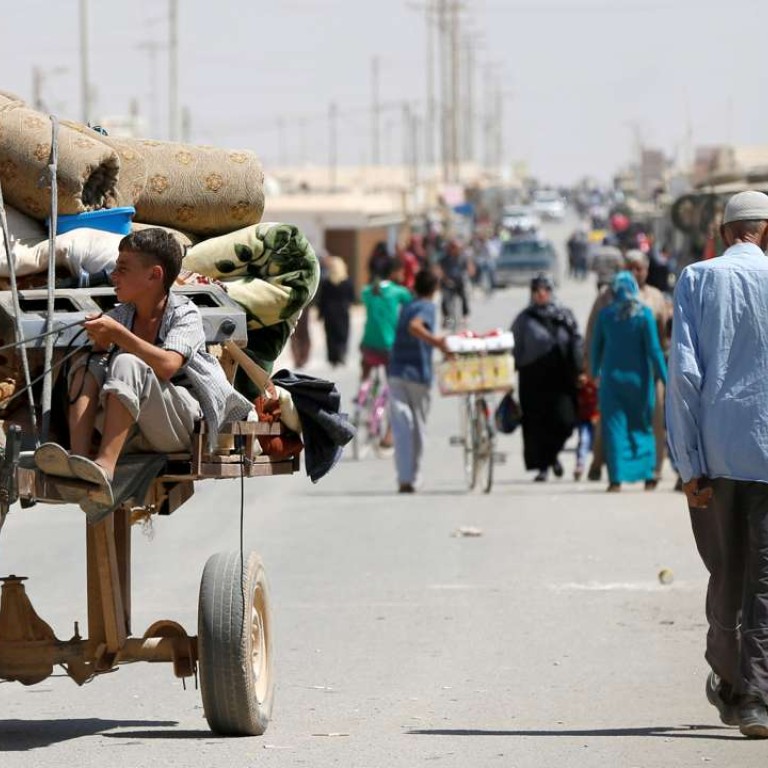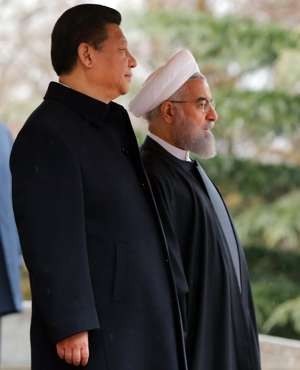
Need growing for China to take greater military role in Middle East, analysts say
Greater presence seen as way to protect nationals working abroad and growing investment in the region
As China expands its interests in the Middle East, some experts are calling for Beijing to eschew its long-standing policy on non-interference in other countries’ affairs and set up permanent military bases.
A more comprehensive engagement would ensure better protection for Chinese nationals working in the region and the significant investment by Chinese companies there, they said.

In January, Chinese President Xi Jinping visited Saudi Arabia and Iran when the two nations broke off diplomatic ties, in a bid to stay friendly with both sides on the Sunni-Shiite divide. He brought with him US$55 billion in loans and investments for the region, including a US$20 billion fund for the United Arab Emirates and Qatar.
Key facts behind China’s warming ties with Saudi Arabia, Iran and Egypt as Xi Jinping signs mega oil deals during his Middle East tour
China is also taking a greater role in Syria, where Russia and the United States have brokered a fragile truce. Rear Admiral Guan Youfei, director of international cooperation at the Central Military Commission, said last month Beijing would provide Damascus with aid and training.
Observers said the stepped up engagement in the region reflected Beijing’s increasing eagerness to take a stake in global affairs and ensure its construction projects or other investments remained protected in conflict zones.
Although we received anti-terrorism training before coming here, we are really afraid of unexpected conflicts
“The recent sudden increase of Chinese military activity in the Middle East reflects that Chinese policymakers have realised the nation needs to react better to developments in the troubled region,” said Wang Lian, a Middle East affairs expert at Peking University.
Chinese residents living in the region say security risks are always a concern for them and Beijing should take stronger steps to ensure their safety. “Although we received anti-terrorism training before coming here, we are really afraid of unexpected conflicts,” said Cai Guoxin, an engineer at China Huanqiu Contracting and Engineering Corporation in Saudi Arabia. “What if someone rushes into our building and takes us hostage?”
China to deepen military engagement in troubled Middle East to protect growing interests
The company, under China National Petroleum Corporation, is extracting phosphorite in Saudi Arabia’s northwestern corner, bordering Jordan to the west and Iraq to the north. The project employed as many as 5,500 people at its peak.
“If there was a special kind of organisation set up to better safeguard our life and property, that would be ideal. The more militarised the organisation, the better,” Cai said.

The shift in engagement comes as China has increased arms sales to the region, although the size pales in comparison to what the US supplies. America continues to dominate the trade, delivering more than 58 per cent of the arms imports between 2001 and 2014, according to a report by the Centre for Strategic and International Studies. Western Europe was the second largest supplier, and Russia third.
Many Middle East countries do not know how to use Chinese weapons, so the Chinese government has to provide training
China supplied just 3.5 per cent between 2007 and 2010, according to the institute. But even at that level, the region accounted for a sizeable amount of China’s weapons exports, receiving about 27 per cent between 1970 and 2015, according to the Stockholm International Peace Research Institute.
Zhou Chenming, who worked for a subsidiary of China Aerospace Science and Technology
Corporation that he didn’t want named, said Chinese arms were welcomed in some Middle East countries due to their lower price.
China almost doubles weapons exports over past five years, with Pakistan biggest buyer: think tank
“Arms sales to the Middle East is a good business. But problems arise as many Middle East countries do not know how to use Chinese weapons, so the Chinese government has to provide training to countries like Syria, which is also a form of military cooperation,” Zhou said.
Observers said Beijing’s military engagement with the Middle East and North Africa should be more comprehensive, even if that entails a change in diplomatic fundamentals.

While US installations and bases are sprinkled throughout the region, China has only one military facility, in the northeast African nation of Djibouti.
“To shore up protection of overseas Chinese interests, Beijing needs to drop such an obsolete mindset as refusing to send any troops to foreign countries or interfering with other countries internal affairs,” said Li Jie, a Beijing-based military expert.
More Chinese bases abroad? Beijing ‘willing’ to build facilities to protect overseas interests
A mechanism for security responses could ensure Beijing had a window of opportunity to act in the critical hours after events unfolded.
In the absence of that option, many Chinese businesses relied on local government forces for protection, Zhou said.
“But this is neither sufficient nor timely during emergencies, for some Middle East governments are not stable,” he said.

